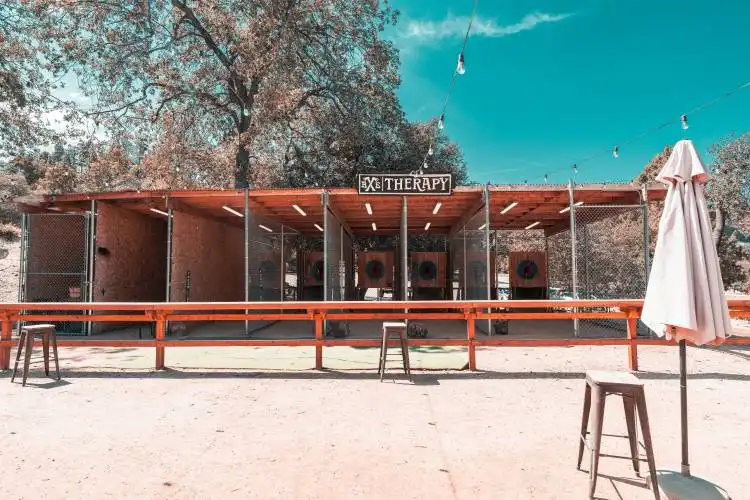Start a Crematorium
Honoring Life's Final Passage: The Noble Journey of Running a Crematorium
| Updated


CREMATORIUM
Welcome to the unique albeit innately solemn business of running a Crematorium! At first glance, it might seem a bit eerie, but caring for people in their times of loss is really a noble profession. As a boat rower helps people cross rivers, in a similar vein, a crematorium helps souls cross the ultimate passage. The business primarily involves providing respectful and meaningful funeral and cremation services to families grieving the loss of a loved one. Expect tears, yes, but also heartfelt 'thank yous' for providing a dignified farewell.
Jump to Business Plan
RELATED BUSINESS IDEAS
Browse ALL Hospitality & Leisure Ventures Business Ideas
Discover Your Perfect Domain
Unlock the door to your online success with our hand-picked selection of premium domain names. Whether you're starting a new venture or rebranding an existing one, the right domain can set the tone for your digital presence. Browse through our curated list, each with its unique potential to enhance your brand's visibility and credibility.
CREMATORIUM MINI BUSINESS PLAN
This a quick reality check to help you identify the strengths and weaknesses of your business concept before you dive in.
Business Idea: Crematorium
Expected Percent Margin:
- Gross Margin: 60-70%
- Net Profit Margin: 20-30%
Earnings Expectations:
- Daily Earnings: $400 - $1000
- Weekly Earnings: $2800 - $7000
- Monthly Earnings: $12,000 - $30,000
- Annual Earnings: $144,000 - $360,000
Actions to Hit Those Numbers:
Equipment and Licensing:
- Initial Investment: An investment of $150,000 - $500,000 for cremation equipment, facilities, and licensing.
- Professional Licensing: Make sure to get state licensing and any necessary permits.
Marketing and Customer Acquisition:
- Community Outreach: Regularly engage with local community events and organizations.
- Online presence: Update your website consistently and optimize it for SEO.
Services and Customer Experience:
- Additional Services: Consider offering additional services, such as memorial products or funeral planning assistance.
- Customer Services: Providing excellent customer support, compassionate and respectful service towards clients.
Cost Control:
- Fuel Cost: The cost of cremation includes natural or propane gas. Keep energy costs low by maintaining and updating equipment.
- Waste Management: Stay eco-friendly by figuring out the best ways to handle waste materials.
Business Operations:
- Operating Hours: Open 24/7 for emergency cases and maintain general opening hours for appointments.
- Transaction Volume: Cremations per day could vary widely depending on population size and local cultural/religious norms. Aim for at least 2-5 per day.
Always remember to consider current market competition, economic condition, potential community backlash, and legal considerations. Consulting with a business advisor is always recommended.
NOT WHAT YOU HAD IN MIND? Here are more ideas



Browse ALL Hospitality & Leisure Ventures Business Ideas
Grab Your Business Website Name
Before you get caught up in the whirlwind of setting up your business, invest in a domain name. It's a small but significant step that lays the foundation for your brand and makes it easier for customers to find and trust you. Just like you wouldn't build a house without securing the land first, don't build a business without securing your domain name.
"Why? Can't that wait?" Here's why it shouldn't
Step 1: Determine if the Business is Right Endeavor
Breakdown of Startup Expenses
Before starting a crematorium, it is important to understand the startup costs associated with the business. This includes the cost of purchasing or leasing the building, equipment, and supplies, as well as any legal fees associated with registering the business. Additionally, the cost of hiring staff and marketing the business should be taken into consideration. It is important to have a comprehensive understanding of the costs associated with starting a crematorium to ensure that the business is financially feasible.
Breakdown of Ongoing Expenses
Once the business is up and running, there are ongoing expenses that should be taken into consideration. This includes the cost of utilities, insurance, and any necessary repairs or maintenance. Additionally, the cost of purchasing supplies such as caskets and urns should be taken into consideration. It is important to have a comprehensive understanding of the ongoing expenses associated with running a crematorium to ensure that the business is financially viable.
Examples on Ways to Make Money
There are several ways to make money with a crematorium. The most obvious way is to charge for the cremation services. Additionally, the business can offer additional services such as memorial services, burial services, and cremation urns. Additionally, the business can offer additional services such as pre-planning and aftercare services. It is important to have a comprehensive understanding of the various ways to make money with a crematorium to ensure that the business is profitable.
Step 2: Name the Business
Naming a business is an important step in the process of starting a crematorium. It is important to choose a name that is memorable, conveys the purpose of the business, and is easy to pronounce. It is also important to make sure that the name is not already in use by another business. To ensure that the name is not already taken, it is necessary to check with the local government and the United States Patent and Trademark Office. Additionally, it is important to make sure that the name is available as a domain name and social media handle.
Once the name is chosen, it is important to register the business with the state and obtain the necessary licenses and permits. This will help to protect the business from any legal issues that may arise in the future. Additionally, registering the business will help to ensure that the business is operating legally and is in compliance with all local, state, and federal laws.
It is also important to consider the branding of the business. This includes the logo, website, and any other marketing materials. It is important to ensure that the branding is consistent and conveys the purpose of the business. Additionally, it is important to make sure that the branding is memorable and recognizable.
Finally, it is important to consider the long-term implications of the business name. It is important to make sure that the name is not offensive or insensitive in any way. Additionally, it is important to make sure that the name will not be associated with any negative connotations in the future. This will help to ensure that the business is well-received and respected in the community.
Step 3: Obtain Necessary Licenses and Permits
In Step 3 of starting a crematorium, it is important to research local and state requirements for obtaining the necessary licenses and permits. This includes researching the local zoning laws, as well as any other laws that may apply to the business. It is also important to research any state licensing requirements that may be necessary in order to operate a crematorium. Depending on the state, there may be additional requirements such as a special license or certification. It is important to research these requirements thoroughly and obtain the necessary licenses and permits before beginning operations.
Once the necessary research is complete, the next step is to obtain the necessary licenses and permits. This may involve submitting an application to the local government or state agency, as well as paying any applicable fees. It is important to ensure that all licenses and permits are obtained before beginning operations, as failure to do so could result in fines or other penalties. Additionally, it is important to keep these licenses and permits up to date, as they may need to be renewed periodically.
Step 4: Secure Financing
Explore Different Financing Options
Starting a crematorium business requires a significant amount of capital, so it is important to explore all of the financing options available. One option is to apply for a business loan from a bank or other lending institution. Additionally, it may be possible to secure a loan from family or friends, or to use personal savings. It is also possible to apply for grants or other types of funding from local or state governments. Finally, it may be possible to secure a loan from a venture capital firm or angel investor.
Create a Business Plan
Once the financing options have been explored, the next step is to create a business plan. This should include an executive summary, a description of the business, a market analysis, a competitive analysis, a description of the product or service, a financial plan, and a management plan. The business plan should also include a detailed breakdown of startup costs and ongoing expenses, as well as a plan for how the business will make money. It is important to be as detailed and thorough as possible when creating a business plan, as this will help to secure financing.
Step 5: Find a Suitable Location
When looking for a suitable location for a crematorium, it is important to consider the zoning laws in the area, the size of the facility, and the availability of utilities. It is also important to consider the proximity to other businesses and the local population. Additionally, it is important to consider the potential for expansion and the cost of the property.
Research Local Zoning Laws
Before selecting a location for the crematorium, it is important to research the local zoning laws. This will help ensure that the business is in compliance with local regulations. Additionally, it is important to research any potential restrictions that may be placed on the business. This includes restrictions on the size of the facility, the type of services that can be provided, and the types of materials that can be used.
Consider the Size of the Facility
When selecting a location for the crematorium, it is important to consider the size of the facility. This will help ensure that the business has enough space to accommodate the needs of the business. Additionally, it is important to consider the potential for expansion in the future.
Consider the Availability of Utilities
When selecting a location for the crematorium, it is important to consider the availability of utilities. This includes water, electricity, and sewer. Additionally, it is important to consider the cost of the utilities and the potential for future increases in the cost.
Consider Proximity to Other Businesses and Local Population
When selecting a location for the crematorium, it is important to consider the proximity to other businesses and the local population. This will help ensure that the business is accessible to potential customers. Additionally, it is important to consider the potential for increased foot traffic in the area.
Consider Potential for Expansion
When selecting a location for the crematorium, it is important to consider the potential for expansion. This will help ensure that the business has enough room to grow in the future. Additionally, it is important to consider the cost of expanding the facility and the potential for increased costs in the future.
Consider the Cost of the Property
When selecting a location for the crematorium, it is important to consider the cost of the property. This will help ensure that the business is able to afford the property and that the cost is within the budget. Additionally, it is important to consider the potential for increased costs in the future.
Step 6: Purchase Necessary Equipment
When it comes to purchasing the necessary equipment for a crematorium, it is important to do your research. There are a variety of equipment options available, so it is important to compare the different options and determine which one is the best fit for your business. You should also consider the cost of the equipment and the maintenance that will be required.
Purchase Necessary Equipment
Once you have done your research and determined which equipment is best for your business, you can purchase the necessary equipment. You may need to purchase an incinerator, a cremation chamber, a cooling chamber, a cremation urn, and other necessary equipment. Make sure you purchase the necessary equipment from a reliable source and that it meets all safety standards.
Install Necessary Equipment
Once you have purchased the necessary equipment, you will need to install it. This may require the help of a professional, so make sure you hire someone who is experienced in installing crematorium equipment. This will ensure that the equipment is installed correctly and that it is safe to use.
Test Necessary Equipment
Once the equipment is installed, it is important to test it to make sure it is working properly. This will help ensure that the equipment is safe to use and that it is functioning correctly. You should also make sure that the equipment is regularly maintained and inspected to ensure that it is in good working condition.
Step 7: Market the Business
Once the business is up and running, it is important to create a marketing plan to reach potential customers. This plan should include a budget for advertising, a list of target markets, and a strategy for getting the word out about the business. It is also important to consider how to differentiate the business from competitors. For example, a crematorium could offer additional services such as grief counseling or memorial services.
Utilize Social Media
Social media is a great way to reach potential customers and build brand awareness. Creating a website and social media accounts for the business can help to spread the word about the services offered. Additionally, social media can be used to engage with customers, answer questions, and provide updates on the business.
Network with Funeral Homes
Networking with local funeral homes is a great way to get the word out about the business. Funeral homes often have relationships with local families and can refer them to the crematorium. Additionally, the crematorium can offer discounts to funeral homes for referring customers.
Participate in Local Events
Participating in local events such as trade shows and community events can help to spread the word about the business. Additionally, these events can be used to connect with potential customers and answer any questions they may have.
Step 8: Hire Employees
When hiring employees, there are several considerations to keep in mind. First, consider the type of employees you need. Do you need full-time, part-time, or contract employees? You should also consider the qualifications and experience of the employees. It is important to hire employees who are knowledgeable and experienced in the cremation industry. Additionally, you should consider the cost of hiring employees. You should factor in the cost of wages, benefits, and any other associated costs.
Finding Employees
Once you have determined the type of employees you need, you can start looking for them. You can start by posting job openings on job boards and social media sites. Additionally, you can reach out to local colleges and universities to find qualified candidates. You can also contact local cremation associations and organizations to find potential employees. Finally, you can contact local funeral homes and crematoriums to see if they have any employees who may be interested in working for your business.
Step 9: Develop Policies and Procedures
The ninth step in starting a crematorium is to develop policies and procedures. It is important to have a clear set of policies and procedures in place to ensure the safety and security of the crematorium and its employees. Policies should include safety protocols, customer service guidelines, and any other procedures that need to be followed. Procedures should include how to handle cremations, how to store ashes, and how to handle customer inquiries. It is important to have a clear set of policies and procedures in place to ensure that the crematorium is running smoothly and efficiently.
Establish Rules and Regulations
In addition to policies and procedures, it is also important to establish rules and regulations. Rules and regulations should include any laws or regulations that need to be followed in order to operate a crematorium. This includes local, state, and federal laws, as well as any other regulations that need to be followed. It is important to make sure that all rules and regulations are followed in order to ensure that the crematorium is operating legally and ethically.
Create a Training Program
Once policies, procedures, and rules and regulations have been established, it is important to create a training program for employees. A training program should include information on how to safely and properly operate the crematorium, as well as how to handle customer inquiries and complaints. Training should also include information on how to handle ashes and how to properly store them. It is important to ensure that all employees are properly trained in order to ensure the safety and security of the crematorium.
Implement Policies and Procedures
Once policies, procedures, rules and regulations, and a training program have been established, it is important to implement them. This includes making sure that all employees are aware of the policies and procedures, as well as making sure that all rules and regulations are being followed. It is also important to make sure that the training program is being followed and that all employees are properly trained. Implementing policies and procedures is essential in order to ensure that the crematorium is running smoothly and efficiently.
EXPLORE MORE CATEGORIES
Browse ALL Business Idea Categories
TAKE THE NEXT STEPS










